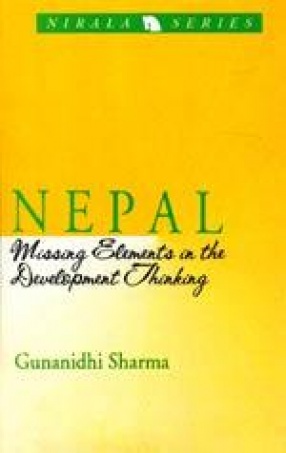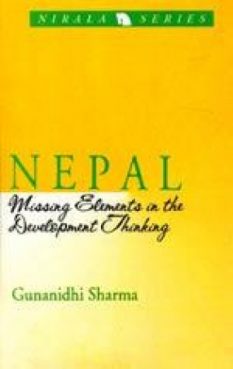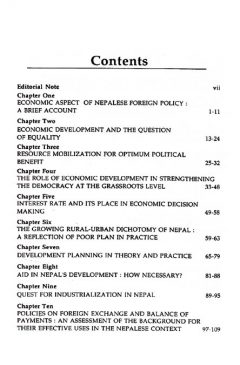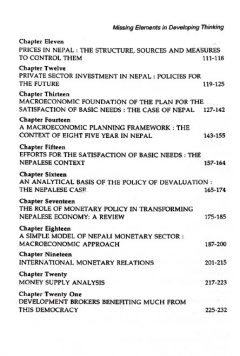Missing Elements, an outcome of Gunanidhi Sharma’s recent researches, sheds light on the development thinking required for the realisation of greater democracy accompanied by a sense of stronger nationhood and self-sufficiency. The book begins with a brief survey of the scenario of economic development in Nepal and the potential it possesses to strengthen democracy at the grass root levels. Employing the most recent empirical data available so far, Sharma analyses the present economic position of Nepal as explained by internal and external forces undermining her will to remain economically and politically consolidated. The book pinpoints he economic hardships of Nepal, focusing on issues like Nepal’s quest for industrialisation, role of aid in Nepal’s development, interest rate and its place in economic decision making, growing rural urban dichotomy and question of development planning. Attacking Nepal’s recent drive towards aggressive liberalisation, privatisation and deregulation, Sharma examines the basic constraints of the economy that have dragged Nepal’s economic performance behind. In addition to this, issues like policies of foreign exchange and balance of payments, prices in Nepal, private sector investments, policies of devaluation, Nepalese monetary sector, international monetary relations and money supply analysis are at length discussed. In short, Missing Elements formulates an agenda to usher Nepal’s democracy into an era of prosperty and self-reliance.
Nepal: Missing Elements in the Development Thinking
Add to favorites
Contents
$18.90
$21.00
In stock
Free & Quick Delivery Worldwide
All orders amounting to US$ 50 or more qualify for Free Delivery Worldwide. For orders less than US$ 50, we offer Standard Delivery at $14 per book.
ABOUT THE AUTHOR Gunanidhi Sharma
Gunanidhi Sharma, born at Palpa, Nepal, was educated first at Tribhuvan University and later at the University of Rajasthan where in 1986 he received a Ph.D. for his research on the monetary structure of the Nepalese economy. Since then, Sharma has remained active and published on economic problems facing Nepal in the well known magazines. He has published several books, most noted being, Monetary Structure of the Nepalese Economy and a Macro-economic Study of the Nepalese Plan Performance (Nirala, 1989). These books have done modeling exercises for Nepal. Besides, in a book edited by APDC and PIDE, of which he is the co-author, Link Model has been specified and worked out for the SAARC region. He was also in a team of researchers devising planning model (Input-Output for Nepal. He is acclaimed to be the first to develop the monetary sector model, macro economic model (both for Nepal) and a link model for Nepal vis-a-vis SAARC countries. Besides, his unique but pioneering exercises in Nepal were the Report of high level commission in Streamlining the supply system in Nepal, 1995 and TU Pay Commission 1996 of whom he was the chairman. He is also co-editor of recently published book Debt-Trap and its Management in Nepal (1998). He has been involved in different capacity, as an expert, an advisor, an economist and a project coordinator in several research activities supported by World Bank, UNEP, WWF, USAID and other national and international organizations. Currently, he teaches Economics at Central Department of Economics, Tribhuvan University, Kathmandu, Nepal.
reviews
0 in total
Review by Anonymous
Be the first to review “Nepal: Missing Elements in the Development Thinking” Cancel reply
You must be logged in to post a review.
Bibliographic information
Title
Nepal: Missing Elements in the Development Thinking
Author
Edition
1st ed.
Publisher
ISBN
8185693668
Length
xvi+232p., Tables; References; Appendices; 23cm.
Subjects








There are no reviews yet.